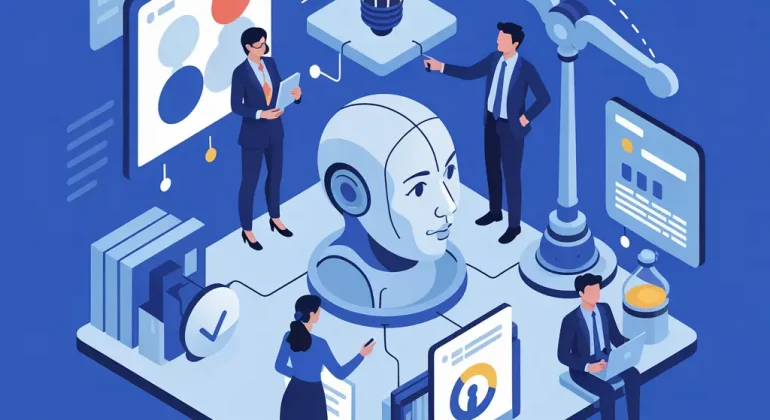The rapid evolution of generative artificial intelligence (AI) has transformed the creation and use of content, raising complex questions regarding copyright. This article provides a comprehensive overview of recent legal actions and legislative initiatives related to generative AI and copyright, highlighting the challenges and opportunities that emerge in this dynamic landscape.
Sommaire
Recent legal actions in the United States
In the United States, several lawsuits have been initiated concerning the use of copyrighted works in training generative AI models.
In this class action lawsuit, authors Richard Kadrey, Sarah Silverman, and Christopher Golden allege that Meta Platforms Inc. infringed their copyrights by using their books to train its AI model, LLaMA (Large Language Model Meta AI). On November 20, 2023, the U.S. District Court for the Northern District of California dismissed several claims, including those for direct copyright infringement based on the derivative work theory and vicarious copyright infringement. However, the court allowed the plaintiffs’ claims related to the removal of copyright management information under the Digital Millennium Copyright Act (DMCA) to proceed, acknowledging that the plaintiffs had alleged sufficient injury for Article III standing. Subsequently, on March 10, 2025, the plaintiffs filed a motion for partial summary judgment on direct copyright infringement, arguing that Meta cannot rely on a fair use defense concerning its alleged acquisition of “millions of pirated works” used to train its model.
Legal proceedings against OpenAI and Microsoft
In December 2023, The New York Times filed a lawsuit against OpenAI and Microsoft, alleging that their AI models were trained using the newspaper’s articles without authorization, constituting copyright infringement. This case underscores the growing tensions between content creators and AI developers regarding the use of protected works in AI training. As of March 2025, a federal judge has allowed the lawsuit to proceed, dismissing some claims but permitting the core allegations of copyright infringement to move forward.
International legal developments
Legal actions related to generative AI and copyright are also increasing internationally.
Legal action in France against Meta
In France, three associations representing authors and publishers—the Syndicat National de l’Édition (SNE), the Société des Gens de Lettres (SGDL), and the Syndicat National des Auteurs et des Compositeurs (SNAC)—have initiated proceedings against Meta. They allege that Meta used copyrighted works without authorization to train its generative AI model. This is the first action of its kind in France, demanding copyright enforcement and the complete removal of data repositories used for AI training.
Legislative and regulatory initiatives
In response to these challenges, several legislative and regulatory initiatives have been proposed or implemented.
United States: Generative AI Copyright Disclosure Act
In April 2024, U.S. Representative Adam Schiff introduced the Generative AI Copyright Disclosure Act. This bill requires companies to disclose the copyrighted works used to train their generative AI systems by submitting a notice to the Register of Copyrights at least 30 days before the public release of a new or updated AI model. Penalties for non-compliance start at $5,000, with no maximum penalty specified.
European Union: AI Act
In the European Union, the proposed Artificial Intelligence Act (AI Act), which was formally adopted on 13 March 2024, includes specific provisions designed to address intellectual property concerns related to generative AI.
Among its key requirements, the AI Act mandates that developers of general-purpose AI models, including generative AI systems, must provide detailed documentation on the content used for training, including information on whether the datasets contain copyright-protected material. This transparency obligation is aimed at ensuring that rights holders are aware of how their works may have been used.
Additionally, the Act introduces a duty to clearly label AI-generated content, enabling consumers and rightsholders to identify content created without direct human authorship.
These measures reflect the EU’s broader objective to strike a balance between fostering AI innovation and safeguarding intellectual property rights, especially as tensions grow between creators and developers of large-scale AI systems.
Conclusion
The intersection of generative AI and copyright law is a rapidly evolving field, marked by significant legal actions and legislative efforts worldwide. As AI technology continues to advance, it is imperative for stakeholders—including developers, content creators, and legal professionals—to stay informed and engaged with these developments to navigate the complex landscape effectively.
FAQ
What is generative AI?
Generative AI refers to artificial intelligence systems capable of creating content, such as text, images, or music, based on patterns learned from existing data.
Why is generative AI raising copyright concerns?
Generative AI models are often trained on large datasets that include copyrighted works, leading to concerns about unauthorized use and potential infringement.
What is the Generative AI Copyright Disclosure Act?
It is a proposed U.S. legislation requiring companies to disclose the copyrighted materials used to train their generative AI systems, aiming to increase transparency and protect creators' rights.

